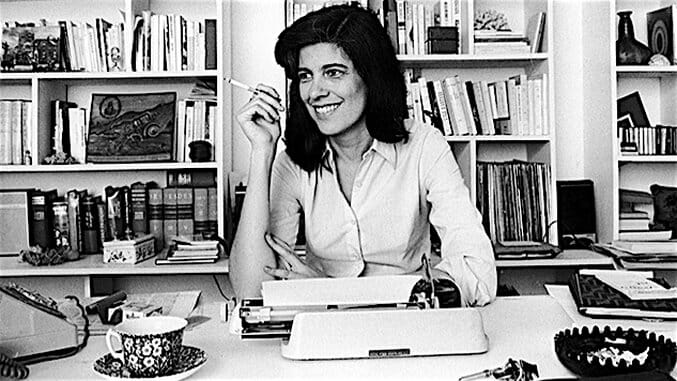5 Intriguing Documentaries about Writers

A lot of writers aren’t necessarily good talkers. That’s why it might seem counterintuitive to make documentaries about them, considering the process of writing isn’t naturally thrilling. It’s a pretty painstaking thing to watch. But the world of the glamorous literati—respected authors lauded with glowing reviews and champagne receptions—is full of some larger-than-life characters. From Gore Vidal to Susan Sontag, the literary giant was once key to the social scene—and typically as witty out loud as they were on the page. So here are five explorations of the sparkly world of bestselling authors.
1. Author: the JT Leroy Story (2016)

If an author’s persona has a certain importance to their readership, JT Leroy’s was one of the most strange and complex writerly identities in recent memory. Bestselling book The Heart Is Deceitful Above All Things was seemingly written by a rough-and-tumble young man who’d been a child prostitute and had contracted HIV in the exchange. Celebrity status was bequeathed upon him and he was showered in adulation by movie actors, rock stars, and the cream of ’90s pop culture. When it turned out that JT Leroy was never real—that the actual author was a middle-aged woman who employed a close friend to personify him—the media went wild. Was this a literary hoax, a case of nom de plume gone too far, or a straight-up con? The doc manages to depict the bizarre mindset of Laura Albert (the mastermind of JT Leroy), but her motivations are still shrouded in mystery.
2. Regarding Susan Sontag (1960)

The intriguing author and essayist gets a lifelong biographical film in this treatment by filmmaker Nancy Kates Seemingly enamored by photos of Sontag—who was undeniably photogenic—the doc is heavy on imagery, but also makes plenty of time for quotations, making this a decent primer on Sontag’s work as much as her life itself. Following her preternatural brainpower at grade school right up until her death, Kates’ film posits Sontag as a literary goliath, an articulate charmer, and a passionate political activist—who could nonetheless be a stinging adversary and a cruel lover when she wasn’t scribbling her genius onto the page.
3. The Life and Times of Allen Ginsberg (1994)

The ’50s beat poetry scene and its figures have been a perennially popular subject for cinema of all kinds, from feature films to docs like this one. The counterculture vibe, stink of marijuana-laced rebellion, and seemingly approachable style of poetry all make it rather well-tred ground. But this biographical film on Howl writer Allen Ginsberg, featuring celebrity interviews of a mind-boggling caliber, really attempts to understand the poet’s preoccupations and background. With footage of his live readings and casual interactions, it’s essential for any of his fans.
4. A 50 Year Argument (2014)

Martin Scorsese takes on an institution with his documentary film charting the history of the New York Review of Books. Relying on the stories of longtime editor Robert Silver, the film jumps around through a half-century of highbrow contemporary writing. The NYRB has a tradition of authors writing brightly about the most pressing issues of the day, from the civil rights movement to the Arab spring. Featuring interviews and archive footage of literary luminaries—Joan Didion, Noam Chomsky, James Baldwin, et al.—this is a must-watch for any lover of American lit, or New York history geeks.
5. Best of Enemies (2015)

This doc is a thoroughly entertaining account of the long-standing feud between Gore Vidal and William F. Buckley Jr.—a grudge that spread from their writing to real life, and even threatened to spill into violence at times. Vidal, an effete dyed-in-the-wool liberal born into old money, and Buckley Jr.—a posturing-prone conservative who constantly needled the women’s liberation movement—were by both disposition and ideology the antithesis of each other. But they did share prodigal talents and enormous egos, fueling the fire of their criticism of each other. With subsequent talking-head interviews and plenty of funny talk show footage, the depiction of this intellectual grudge match celebrates the lively public discourse of the ’70s.
Christina Newland is a writer on film and culture for VICE, Esquire, Sight & Sound, Little White Lies, and others. She’s a displaced New Yorker in love with ’70s Hollywood and boxing flicks.







































